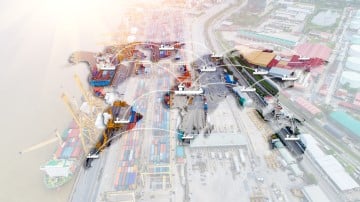Transport Management Systems (TMS)
Logistics Consultancy » Transport Management Systems
What is a Transport Management System
A Transport Management System (TMS) is software to enable planning, execution, and optimisation of transport movements across the supply chain. TMS takes order data from the WMS to plan and track it into transport movements. They are deployed to drive efficiencies in inbound and outbound logistics movements across all modes of freight.
Plan shipments based on cost, efficiency, distance and service
Execute deliveries by communicating with carriers, providing documentation and tracking progress
Optimise operations by tracking carrier performance via analytics and reporting
Advantages of a Transport Management System
A TMS streamlines transport operations with improved planning and execution, providing a better service to its customers. The main advantages are:
- Improved shipment traceability in real-time tracking
- Enhanced accuracy of delivery
- Improved customer service with real-time customer access
- Cost savings by using analytics and route optimisation
- Efficiency improvements resulting from better data
- Increased control of vehicle flows with scheduling functionality
- Carbon footprint reductions through reduced paperwork and better routing
Transport Management software provides the most benefit to operations with complex transport networks. It’s ability to provide increased visibility. The ability to provide increased visibility across the supply chain, irrespective of mode of transport and beyond typical geographic barriers helps navigate the complexities of modern supply chains.
How BoxLogic Can Help
BoxLogic supports our clients throughout their transport management system journeys from a review of existing systems all the way to the selection and implementation of a new TMS solution.
Project Stage | How Can BoxLogic Help |
|---|---|
Review Current TMS | Assess capability of the incumbent TMS to meet current and future operational requirements. |
Gaps Analysis | Identify the functionality gaps between current TMS and business requirements or latest market developments. |
Requirements Gathering | Documentation and categorisation of business requirements across transport and warehouse processes for TMS. |
Process Mapping | Mapping of the ‘as-is’ and ‘to-be’ processes of the transport operation. |
Functional Design Specification | Full documentation of the operational requirements for issue to TMS development and configuration. |
Business Case Support | Provision of expert support to build an achievable and robust business case for new or upgraded TMS software. |
Vendor Selection | Full management of, or provision of expertise through the tender process for a new TMS using extensive market knowledge. |
Systems Testing | Creation of, leading or management of testing programme to capture issues prior to a go-live, including load testing, integration testing, smoke testing, user acceptance testing and business readiness testing. |
Training & Go-Live Support | Project management or operational support to deliver a smooth implementation and cut over to a new solution. |
Our Process
BoxLogic can deliver the end-to-end deployment of a TMS. We are flexible in our approach and can contribute throughout or only in specific parts of the project where external expertise is needed. An end-to-end project approach might be:
We develop a strong working understanding of your transport and warehouse operations with a site visit. A kick-off workshop and interviews with key stakeholders, including IT, help to further our knowledge of the project requirements, TMS landscape and IT infrastructure.
A high-level process review with a TMS super-user completes our familiarisation. If no TMS is in place, then we will familiarise ourselves with the current tools and ways of working.
We conduct a detailed walk through of the end-to-end transport processes with super users and members of the transport team to understand of the ‘as-is’ flows. At this stage, we take the opportunity to also document the requirements as we go through this process along with all the interfaces with other systems. This also includes understanding the flow of information through the broader IT architecture.
The current processes and operational requirements are compared to the functionality available across the Warehouse Management System marketplace to understand where the existing process and system functionality does not meet the operational requirements.
We then document the gaps or non-standard processes and needs, which inform the To-Be flows.
Current processes are updated to include the new steps to meet the operational requirements.
We start with standardised processes as far as possible while considering requirements and trying to bridge the identified gaps to optimise flows. The agreed ‘to-be’ processes might be able to be deployed within the current system, and if not, they form the basis of a selection process for new TMS software.
A tender process is initiated for a new or upgraded TMS software. The agreed requirements and process flows can be documented in the form of a Functional Design Specification as part of a tender process.
A shortlist of appropriate solution providers is provided with a comprehensive RFQ pack. Vendor solution proposals are submitted and reviewed to select a preferred vendor based on a blend of financial and non-financial criteria.
Delivering a successful project with experienced support in the project management, testing, training and go-live processes. We offer a flexible approach; either leading the project delivery or playing a more supporting steering role. A more active role is usually advised during the design, testing, training and go-live process with much less activity during the ‘Build’ process, which is executed by the TMS provider.
The testing process captures defects for resolution before go-live and is used structured to support the overall change management process, particularly with User Acceptance Testing and Training. Our extensive data validation and cleansing skills are utilised during the Data Upload process pre-go-live. Post go-live support can also be provided but is usually led by the TMS provider.
Why Work With BoxLogic
Our team of dedicated logistics professionals are well placed to help you on your next TMS project for several reasons.
- The BoxLogic consulting team has a strong track record of delivering systems projects across the logistics sector
- Our independence is of the utmost importance to us, so we only recommend solutions or partner that work for our clients
- All BoxLogic recommendations are underpinned with rigorous analysis and modelling to give confidence in our work
- Capability to support our clients on the end-to-end process of driving transport improvements
GET IN TOUCH TODAY
Complete the form and one of our skilled consulting team will be in touch to discuss your warehouse and logistics project today.
Alternatively, give us a call or send an email.
- +44 (0) 118 309 4030
- enquiries@box-logic.co.uk




